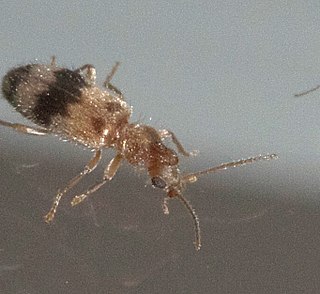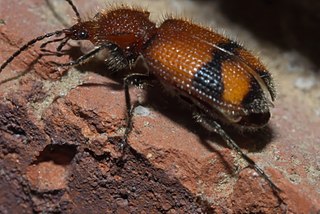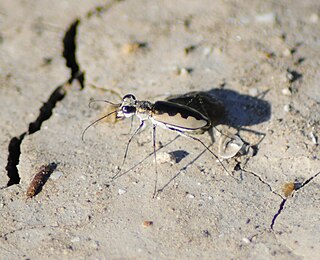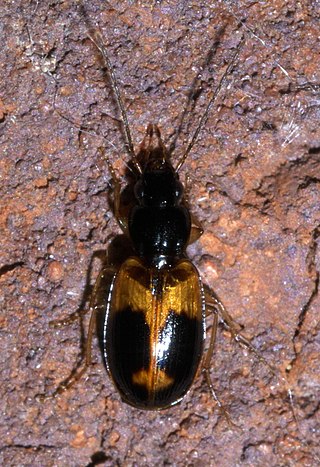
Notoxus is a large genus of beetles that resemble ants. It comprises about 300 species worldwide.

Panagaeus is a genus in the beetle family Carabidae, native to the Holarctic, the Near East, and North Africa, as well as Central and South America. There are about 15 described species in Panagaeus.

Eunota, also known as the saline tiger beetles, is a genus of beetles in the family Cicindelidae first described by Émile Rivalier in 1954. They are found in the United States and Mexico

Licininae is a subfamily of in the beetle family Cicindelidae. There are more than 80 genera and 1,800 described species in Licininae.
Hololeius ceylanicus is a species of beetles in the family Carabidae, the only species in the genus Hololeius.
Dercylus is a genus in the beetle family Carabidae. There are more than 30 described species in Dercylus, found primarily in Mexico, Central America, and South America.

Diplocheila is a genus in the beetle family Carabidae. There are more than 30 described species in Diplocheila.

Brachyodes is a genus in the beetle family Carabidae. There are more than 40 described species in Brachyodes.
Lonchosternus is a genus in the beetle family Carabidae. There are more than 20 described species in Lonchosternus found mainly in Africa, but also on the Iberian Peninsula.
Nanodiodes is a genus in the beetle family Carabidae. There are about five described species in Nanodiodes.
Prionognathus is a genus in the ground beetle family Carabidae. There are at least two described species in Prionognathus.
Simous is a genus in the beetle family Carabidae. There are about nine described species in Simous.

Craspedophorus is a genus in the beetle family Carabidae. There are more than 160 described species in Craspedophorus.

Epomis is a subgenus of ground beetle genus Chlaenius. The larvae of this subgenus are notable for being obligate role-reversal predators. Amphibians such as frogs are normally predators of beetles; however, Epomis larvae feed exclusively on amphibians.

Oodini is a ground beetle tribe in the subfamily Harpalinae. Oodines are found worldwide and are generally associated with standing water. This tribe contains more than 400 species arrayed in 43 genera. Beetles in Oodini are distinguishable from other members of Carabidae by a combination of two characters: a laterally coadunate metepisternum, and an elytral ridge formed by the fusion of intervals 7 and 8.

Anthicinae is a subfamily of ant-like flower beetles in the family Anthicidae.
Vacusus is a genus of antlike flower beetles in the family Anthicidae. There are about six described species in Vacusus.

Cyclodinus is a genus of antlike flower beetles in the family Anthicidae. There are more than 40 described species in Cyclodinus.

Microschemus is a genus of in the beetle family Carabidae. There are more than 20 described species in Microschemus found in Africa and southern Asia.











